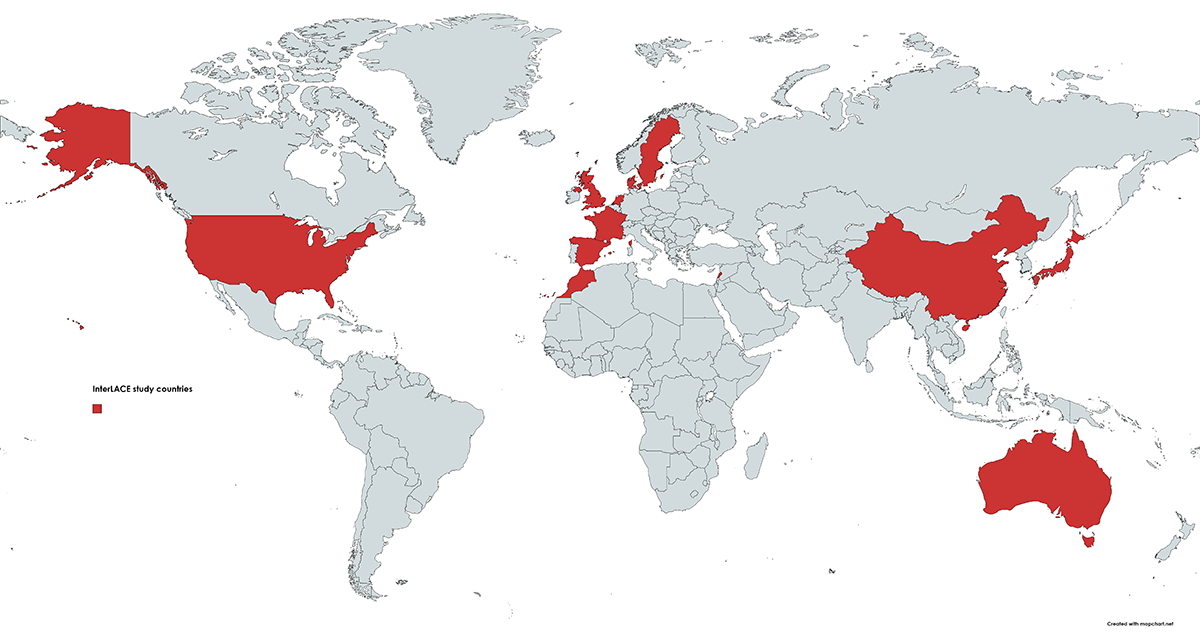InterLACE provides a unique opportunity to conduct world-leading research in collaboration with key national and international investigators on women’s health studies from more than ten countries.
Start date: January 2012
Funding sources: National Health and Medical Research Council, Australian Research Council
The project undertakes cross-cohort research by combining data at the individual level from more than 850,000 participants from 27 existing observational studies to investigate the role of reproductive health across the life course on future chronic disease events including cardiovascular disease and type 2 diabetes mellitus.
While such research poses cross-cohort and cross-cultural challenges, InterLACE has the capability to address research questions and generate robust evidence that is not possible from any single cohort study. InterLACE also enables a detailed review of methodologies currently used in studies on women’s health that will result in recommendations for study design, menopausal symptom measures, and reporting of results to improve international and cross-cultural comparisons.

Contact

Research impact
- The Lancet series on Menopause (2024): An empowerment model for managing menopause
- The Lancet series on Menopause (2024): Optimising health after early menopause
- The Lancet series on Menopause (2024): Promoting good mental health over the menopausal transition
- The Lancet series on Menopause (2024): Managing menopause after cancer
- Evidence review: Queensland women and girls’ health (2023) – informing the development of the Queensland Women and Girls’ Health Strategy 2023-2032
- The NHMRC impact case study (2020) – Women’s reproductive health (InterLACE): case study
- EMAS position statement (2019): Predictors of premature and early natural menopause
- The current state of women’s health in Australia (2018) – informing the development of the National Women’s Health Strategy 2020-2030
Media releases
- [InSight+] Premature and early menopause: the overlooked risk in endometriosis
- [The Guardian] People with endometriosis more likely to experience early menopause
- [News GP] Early menopause risk for endometriosis patients
- [Australian Nursing & Midwifery Journal] Endometriosis linked to premature and early menopause
- [The Conversation] What’s the difference between miscarriage and stillbirth?
- [The Conversation] Women are at greater risk of stroke, the more miscarriages or stillbirths they’ve had
- [InSight+] Stillbirths and miscarriages increase risk of stroke later in life
- [UQ News] Recurrent pregnancy loss linked to increased stroke risk later in life
- [World Stroke Academy] The Paper of the Month March: Infertility, miscarriage, stillbirth, and the risk of stroke among women
- [UQ News] Early menstruation linked to increased menopause symptoms
- [Australasian Menopause Society] Australian study links early menstruation to increased menopause symptoms
- [UQ News] Hot flushes and night sweats linked to 70 per cent increase in cardiovascular disease
- [Daily Mail] Women who suffer hot flushes and night sweats are at much higher risk of suffering heart attacks, angina and strokes, study reveals
- [News GP] Study links hot flushes, night sweats to CVD in women
- [Australian Nursing & Midwifery Journal] Early menopause increases risk of cardiovascular event
- [UQ News] Women encouraged to maintain weight and quit smoking to reduce menopause symptoms
- [UQ News] Early menopause predictor of heart disease
- [News GP] Premature menopause increases cardiovascular disease
- [UQ News] Trends in women’s reproductive events reflect major social and lifestyle changes
- [Oxford University Press] Starting menstrual periods at a young age and childlessness increase risk of premature and early menopause
- [Australasian Menopause Society] Early age menstrual periods increases risk of premature and early menopause
- [UQ News] Women with early periods at increased risk of early or premature menopause
- [UQ News] Weight plays a role in menopause age
Conferences
- 17th World Congress on Endometriosis, 2027, Istanbul, Turkey
- 20th World Congress on Menopause, 20 September - 3 October 2025, Rio de Janeiro, Brazil
- 12th Society of Endometriosis and Uterine Disorders Annual Congress, 9-11 April 2026, Frankfurt, Germany
- 16th World Congress on Endometriosis, 21-24 May 2025, Sydney, Australia
- 19th World Congress on Menopause, 19-22 October 2024, Melbourne, Australia
- Queensland Women’s Health Forum, 11-12 July 2024, Brisbane, Australia
- Queensland Women’s Health Forum, 12-13 September 2022, Toowoomba, Australia
- 17th World Congress on Menopause, 30 April ‒ 3 May 2020, Melbourne, Australia
- Royal Australian and New Zealand College of Obstetricians and Gynaecologists (RANZCOG) 2019 Annual Scientific Meeting, 13‒16 October 2019, Melbourne, Australia
- 12th European Congress on Menopause and Andropause ‒ Managing Midlife Health and Beyond in the Era of e-Medicine, 15‒17 May 2019, Berlin, Germany [Presentation title: Causes and consequences of premature and early menopause: results from the InterLACE consortium ‒ Professor Gita Mishra]






